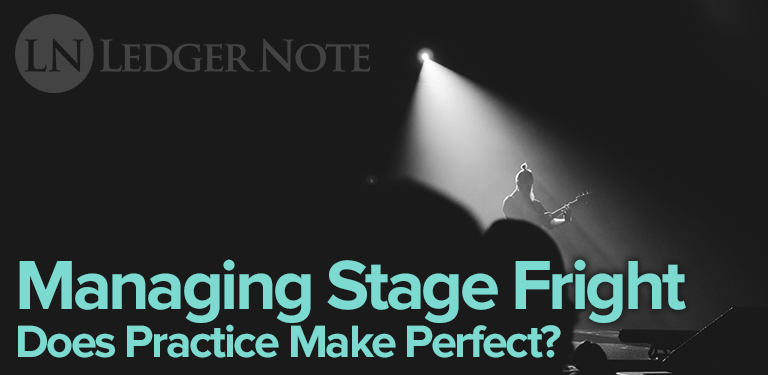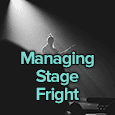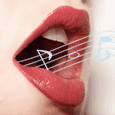
Anxious music students and seasoned performers are often asked, “How long do you practice every day?” Having treated many performers with stage fright, it is important to take a closer look at this question.
The answer is not a simple number of hours (or, in some cases, minutes) that one practices, or even how carefully one practices.
Yes, careful and mindful practice is important. Nervousness is guaranteed if one does not practice sufficiently. But there is far more involved with experiencing performance anxiety, which can “overrule” even the best-prepared performance.
Some performers rehearse or practice right up to going on stage. Others chill out for a couple hours before a performance. Some people eat particular foods - or avoid a certain food or drink. Some do not eat before a performance at all. Others have complex rituals to ward off the jitters.
Clearly one size of coping with stress and anxiety does not fit all. But do these various tactics and strategies actually “work”?
In addition to learning the music, another factor connected to the question about how long to practice lies a concern about mental and musical security on stage regarding memory and technique. However, increasing hours of practice does not guarantee security in public.
What is stage fright? How are we to understand the symptoms and ultimately conquer this nervousness? What can music teachers and students do to help remove this impediment?
What are the Symptoms of Stage Fright?
Stage fright is a formidable challenge for musicians - and others - of all ages and levels of accomplishment. Perhaps the phrase “performance anxiety” is a more correct term because no one is frightened literally by a stage.
Many performing musicians, even the most skilled, experience anxiety when they go onto a stage. This should hint that practice and preparedness are only a small piece of the puzzle.
Performance anxiety and stage fright are two phrases that are used interchangeably. The psychological and physical symptoms expressed can include:
- shaking
- memory slips
- insecurity despite excellent preparation
- fear of ridicule by an audience
- embarrassment and shame
- worry that “something must be wrong with me”
Severe anxiety has the potential to undermine the most-prepared performer. It diabolically threatens self-confidence and self-esteem, and absolutely harms your stage presence.
Therein lies both the problem and an opportunity for an emphasis on important coping strategies while also trying to solve the issue at its core. An important resource for students and performers are their music instructors who can learn and offer coping strategies to enhance their students’ self-esteem.
Who Does Performance Anxiety Affect?
Performance anxiety can be mystifying as well as unnerving. While it comes alive on stage, performance anxiety does not begin on stage, nor is it the private domain of musicians. Anxiety is ubiquitous.
For example, some students may chronically underperform in exams or are so anxious that studying becomes impossible. Additionally, there is high anxiety about acing gate-keeping exams for admission to graduate schools.
Anxiety about job interviews and career decisions doggedly plague talented and competent people. Some physicians, psychologists, and other professionals find their careers and egos are threatened due to not being able to stand before peers and present their research at conferences.
It is not uncommon for university students, in their final year of study, suddenly to develop a phobia surrounding tests and become anxious about their careers post-graduation. Athletes face clutch situations routinely where all eyes are on them to make a basket, a touchdown, a goal, or a home run.
Many ambitious CEOs and business executives cannot present reports at meetings without self-doubt and fear that they will appear incoherent and incompetent. It is not a long distance emotionally from the boardroom to the bedroom, where couples often struggle with intimacy around performance and presentation anxiety.
In addition to teaching music, music teachers are mental health resources. The “answers” for these fears do not lie in “practicing harder or longer.” Yes, students must practice diligently and intelligently. There is no substitute for quality preparation. But this is not where the ultimate cure is found.
Who Can We Turn To?
Students cannot talk themselves out of performance anxiety by following some protocol that is prescribed by an “expert” with fancy credentials. It often requires levels of insight not accessible by the sufferer alone.
Many performers believe that they are the only person with performance anxiety, and they harbor uncomfortable feelings silently, which is absolutely incorrect. For this reason teachers should speak openly about anxiety with students so they're aware that this difficulty affects many people, perhaps even the best.
Not everyone enjoys being the center of attention! This communication should be a norm in the studio and classroom. If teachers can learn to become more aware of the psychological messages students convey through their behavior and speech, they will be able to offer better tools to assist them with their specific versions of the problem.

Performance puts one’s self-esteem as well as talent on the line in public. This type of anxiety deserves as much attention as required to resolve it.
After parents and close family members, teachers are often the most important people in a student’s life. Music teachers, particularly private instructors who work with students on a one-to-one basis over a period of years regarding a single instrument, have relationships with students that are rare among the general teaching (or any other) profession.
They are frequently “first responders.” This is an enormous honor, a huge responsibility, and an important challenge. Unfortunately there are quite a few self-taught musicians with no access to a teacher, friend, or family member who has experience with this issue.
These individuals can consider approaching a professional therapist who can help them find the root reason for the pressure they feel before and during a performance, such as an inflated sense of self-importance in the eyes of others and their ability to even recognize or care about such a specialized mistake.
Often, with no help other than their own extreme courage, repeated exposure can be the solution. Any situation can become normalized if repeated enough times, and stage performances are no different.
Stage Fright Develops Over Time
What happens to the joy in making music when a performer of any age feels anxious about playing in a recital? For many, a recital introduces fears and self-doubts, embarrassment about making mistakes, humiliation and fear about memory slips, worries about pleasing others, being rejected or scorned, and sometimes, outright panic and terror.
In one way, it seems paradoxical that this fear develops at all given that a performer practices regularly and intelligently, is taught carefully by an expert teacher, and is smart and industrious. But in the end it's typically not about knowing the material so much as fearing judgement from others.
Clearly, for musicians and many others, performance anxiety brews unconsciously and develops silently as life experiences, thoughts, physical sensations, emotional experiences, and feelings in the body long before it announces its unwelcome presence on stage.
Presentation anxiety has a long incubation period, usually beginning in childhood. This is particularly pertinent for musicians who begin lessons in their early youth, where it can be caught and deflated before becoming a habitual obstacle.
Example Progression of Symptoms
Cindy was a pianist who always had cold hands before a performance and was acutely aware of the temperature of the concert hall. She said she could not play well or feel comfortable when the room was cold. She struggled with performance fright despite compensating with long hours of practice.
When she was a child, her parents had many squabbles and eventually divorced. Cindy lived with her mother, who was depressed and did not have the energy to devote to her daughter’s feelings about the breakup of the family. Cindy began playing the piano for comfort and became quite accomplished. But she could not understand what she believed was her mother’s “coldness” towards her.

As can happen due to the parallel timing of the incidents, she began to worry endlessly that she would have memory and technique slips on stage, had the persistent thought that she had been responsible for her parent's divorce, and simultaneously felt that her behavior in general and her coping mechanism of playing the piano was the reason why her mother was emotionally chilly.
Cindy unknowingly associated her mother’s coldness with her cold hands. Both her feelings and thoughts were reflected in her stage fright symptoms. She practiced endlessly to try to lower her anxiety about her performance on stage and, subconsciously, to avoid disappointing her mother if she did not perform well. She overly concerned herself with hand warm-up exercises and hand health.
Many years later Cindy realized that playing the piano to calm herself in childhood and being sensitive to the cold (room temperature, cold hands, and mother’s moods) were connected through her emotional symptoms. Cindy had nothing to do with the divorce or her mother’s depression, which Cindy experienced as coldness toward her.
The awareness of coldness and anxiousness had great meaning for Cindy, which could be triggered by a cold room (external trigger - room temperature) or cold hands (internal trigger - physical sensations) or fears about a “cold” audience reaction (thoughts and emotions about rejection).
Although people are still skeptical of these deep levels of connection within our psyches, confronting and reprocessing these memories leads to a significant reduction in the expression of the symptoms of stage anxiety.
The Teacher's Tool Box
Performers bring their life history and feelings about family into music lessons and onto the stage. Disguised emotions and thoughts typically surface as anxiety at the time of a performance. Various strategies are devised by performers to cope, including endless, repetitive, and mindless practicing with the hope it will reduce - or eliminate - their phobia.
Thoughts and feelings under the guise of symptoms must be assessed as carefully as musical technique. Awareness of a student’s thoughts and feelings is an important tool in the teacher’s psychological toolbox. Some may find time with a music therapist useful.
It is no small accomplishment for teachers (or student's for that matter) to communicate and develop a trusting relationship so that anxiety can be explored in a safe environment.
Because performers feel embarrassed about their self-doubts, it takes time, patience, and tact to establish this atmosphere where it feels safe enough to expose your deepest concerns. The effort is worth it.
When teachers realize that symptoms are signaling a special message about worries, doubts, and fears, students allows performers and teachers to become aware that all feelings and thoughts hold meaning and messages.
This realization provides a solid foundation for better managing frightening feelings and helps lower performance anxiety. At times, a professional consultation with a psychologist will be helpful to unravel persistent and chronic symptoms that are debilitating.
While the teacher cannot be a therapist to performers just as a therapist cannot be a music teacher to patients, below are a couple of examples of suggestions that can be both helpful and appropriate in the teacher’s psychological tool box for various student concerns.
Like Cindy, many anxious performers are aware of their cold hands. Teachers can point out that cold hands are a symptom when one is highly anxious (i.e., when the blood rushes away from extremities like fingers and toes to the larger organs such as the heart to prepare for a “fight.” Although this anxiousness is often experienced as a battle by the performer, it need not be one).
Thus, teachers can instruct students how to do slow deep breathing exercises that will lower the heart rate and warm hands. A fun “tool” to use in this endeavor is to wear a Mood Ring – found in many toy stores. As one warms their hands, the ring turns a different color which illustrates that blood has returned to their fingers.
Teachers can help performers become tuned in to their self-statements, which are frequently negative comments about themselves. I call this the Letter B for Belief System. It is helpful to verbally offer a performance scenario and let the anxious performer respond with what that evokes.
Listen for statements such as, ‘I must please the audience. I am afraid I will mess up. The audience will laugh at me if I make mistakes. I want to impress my teacher/parents/audience.”
These types of self-statements exacerbate and raise anxiety. They are symptoms of lowered self-esteem and fears of feeling humiliated in public. What needs to be practiced extensively and with focus - in addition to the instrument - are statements that enhance self-esteem and self-confidence.
These statements include, “I am resilient. I will perform as best as I can. My self-worth is not dependent on my performance, even though performing well is important to me. There is no such thing as a perfect performance. I am going to enjoy the experience.”
Additionally, teachers and sufferers of stage anxiety may find the following book extremely helpful in their journey to quell these concerns:

The book is by Dr. Julie Jaffee Nagel, a psychologist and concert pianist very familiar with stage fright due to her own experiences with it. It was released recently and I've encountered many other people singing its praises since.
The author's accolades include several degrees from the University of Michigan and the Juilliard School, plus too many awards in the psychology and music industries to list. She currently is an editor for the Clavier Companion and operates her own private practice in Ann Harbor, Michigan.
If you're in the area and looking for a specialist you might consider a visit. Learn more about her work, other books, and her area of expertise at JulieNagel.net.
Managing Stage Fright Can Be Done
I emphasize, in closing, that the above suggestions are appropriate in the teaching studio when handled sensitively. They are no substitute for more in-depth psychological approaches that should only be handled by a mental health professional after a detailed evaluation, should the anxiety be severe and ongoing.
It is important and extremely helpful for many performers to probe and learn about the complex issues that fuel and maintain performance anxiety, despite mindful and sufficient practice. Remember, there are no omnipotent or perfect performers, just competent ones.

















